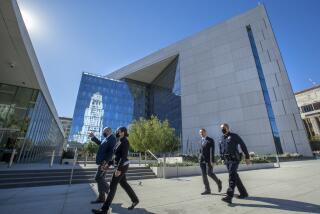Consent Decree Gets Federal Judge’s OK
After months of delay, a U.S. district judge on Friday signed off on a series of historic reforms aimed at overhauling the Los Angeles Police Department through a consent decree with the U.S. Department of Justice.
Under the agreement signed by Judge Gary Allen Feess, the LAPD must move quickly to implement the most sweeping set of changes ever imposed on it from the outside.
The LAPD--which for decades has waged a complicated campaign of reform and resistance--will be required to collect data on the race of people subjected to vehicle and pedestrian stops to determine the extent of racial profiling by LAPD officers. The department must also install a computerized system to track performance evaluations, complaints, disciplinary actions and other data on officers.
In the wake of the Rampart police corruption scandal, the city agreed to enter into a consent decree last November to avoid a lawsuit by the U.S. Department of Justice, which determined there was a “pattern or practice” of civil rights abuses by LAPD officers.
However, Feess--who was randomly assigned by the court to oversee the implementation of the decree--delayed giving his final approval until he was satisfied with all aspects of the lengthy agreement.
The final hurdle came Wednesday afternoon when Feess interviewed the outside monitor chosen by the city and the Department of Justice to track the LAPD’s compliance with the decree.
According to city sources, Feess’ meeting with Michael Cherkasky, a former New York prosecutor who works for a risk mitigation and corporate security firm, was very successful.
“We thought they would make a good match,” Assistant City Atty. Mark Burton said. “We’re elated that he signed it. Now we can get on with the business of police reform.”
Justice officials said they were pleased by the judge’s action.
“We look forward to cooperating with the city of Los Angeles and the LAPD” to implement the decree, a department spokeswoman said.
Deputy Mayor Kelly Martin, who helped negotiate the deal as Mayor Richard Riordan’s representative, said she is hopeful that the decree will improve the LAPD.
“I think the monitor we selected will be fair, thorough and tough,” Martin said. “I think it’s good for the city to move forward. . . . There is a real thorough understanding of the changes that need to take place.”
City and Justice Department officials agreed last month to grant the five-year, $11-million contract to Cherkasky and the firm he heads, New York-based Kroll Associates.
As the “eyes and the ears of the court,” Cherkasky will develop a set of criteria to measure the Police Department’s compliance with the outlined reforms.
Cherkasky will be expected to warn city and police officials if there are violations of the consent decree, and report disputes over compliance to Feess.
“The consent decree will help make a better Police Department,” said former Police Commissioner Gerald L. Chaleff, who also helped write the agreement. “And we have a monitor that everyone believes will do an excellent job.”
Councilman Mark Ridley-Thomas said it was time to move ahead with the reforms.
“We have a lot to do, and there are substantial changes that need to be made,” the councilman said. “To accomplish that will not be easy, and it will not happen overnight.”
A pilot program is underway to test two hand-held computerized devices that officers will use to record the racial data of people who are stopped. The department is expected to offer a community demonstration of the devices in the coming weeks, Ridley-Thomas said.
“The issue of racial profiling has been taken seriously,” he said.
The reforms include:
* Making the LAPD’s internal disciplinary system more transparent and providing mechanisms for holding the police chief more accountable for decisions he makes on disciplinary matters.
* Tightening management and control of the LAPD units that monitor gangs.
* Establishing strict guidelines for the use of confidential informants.
Although many of the fixes are already in progress, Chief Deputy City Atty. Tim McOsker, who will serve as Mayor-elect James K. Hahn’s chief of staff, said: “The real work for the city is ahead.”
More to Read
Sign up for Essential California
The most important California stories and recommendations in your inbox every morning.
You may occasionally receive promotional content from the Los Angeles Times.










